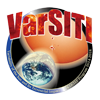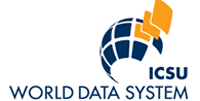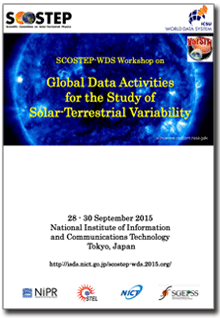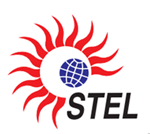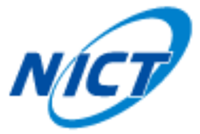Summary of the "SCOSTEP–WDS Workshop on Global Data Activities for the Research of Solar–Terrestrial Variability"
Dates: 28–30 September 2015
Venue: National Institute of Information and Communications Technology (NICT), Koganei, Tokyo, Japan
Principal Sponsors:
- Scientific Committee on Solar–Terrestrial Physics (SCOSTEP)
- ICSU World Data System (ICSU-WDS)
Co-sponsors:
- ICSU-WDS International Programme Office
- Institute for Space–Earth Environmental Research, Nagoya University
- National Institute of Polar Research
- National Institute of Information and Communications Technology
- Society of Geomagnetism, Earth, Planetary, and Space Sciences
Webpage: http://isds.nict.go.jp/scostep-wds.2015.org/index.html
- Number of participants: 71 in total (53 Japanese and 18 foreign participants)
- Number of participating WDS Members: 11
- Number of presented papers: 51 (including 14 posters)
- Categories of presented papers: 4 keynote, 21 data analysis, and 26 data-oriented papers
1. Scope of the Workshop
The principal objective of the Workshop was to stimulate interaction among data providers (WDS members, data centres, data networks, etc.), data scientists, and data-oriented researchers of the SCOSTEP community. The VarSITI (Variability of the Sun and Its Terrestrial Impact) programme of SCOSTEP will strive for international collaboration in data analysis, modelling, and theory to understand how solar variability affects the Earth’s environment. Long-term preservation and provision of quality-assessed data are common objectives for SCOSTEP and WDS. Development of advanced data systems to enable scientists to perform multidisciplinary data-analysis are another common target. Data analysis of selected solar–terrestrial events was an important component of the Workshop also, not only to develop the study of solar–terrestrial variability but also to establish a mutual feedback loop between ‘data users’ and data providers. Principal topics of the Workshop were:
(1) Application of information technologies to mutual data activities
(2) Data systems for VarSITI (data centres, data networks, data-analysis systems, etc.)
(3) Data analysis (VarSITI Campaign Intervals and others)
(4) Data-oriented collaborations between SCOSTEP and WDS
2. Reports of Sessions
2.1 Opening Session (10:30 –12:30, 28 Sep.)
Keynote addresses were given by representatives of SCOSTEP, WDS, CODATA, and the VarSITI Organizing Committee. In these talks, the importance of international and interdisciplinary collaborations for long-term preservation and provision of quality-accessed data was stressed. With greater than 30 Members (data centres, data networks, etc.) enlisted in WDS that are relevant to the endeavours of SCOSTEP at the time of Workshop, collaboration between SCOSTEP and WDS will be important to enforce their activities. CODATA is another data-related body of ICSU covering a variety of aspects on data. Collaborations with the CODATA ‘Earth and Space Science Data Interoperability’ Task Group will be important to introduce advanced data-oriented technology being developed in the CODATA community.
2.2 Future Collaboration between SCOSTEP/VarSITI and WDS (14:00 –17:30, 28 Sep.)
This session was planned to find a strategy for the collaborations between SCOSTEP and WDS. In the keynote talk given by Prof Kazuo Shiokawa (Co-chair of VarSITI), he posed the following questions for discussion.
(1) Data needs: What other databases should be used or built to encourage Sun–Earth interdisciplinary research?
(2) Data access: What efforts are required to make VarSITI generated/needed data open?
(3) Data quality: What efforts are required to make VarSITI generated data reusable? Unify data and metadata formats?
(4) Data legacy: Where will VarSITI data be preserved?
(5) How WDS should treat VarSITI project observation data satisfying/not satisfying the WDS criteria?
Responding to these questions, many ideas and proposals were proposed by the panellists and audience. One point that should continue to be discuss will be the improvement of accessibility to data holdings of VarSITI participants. Numerous VarSITI-oriented data systems—including data centres, metadata networks, and data portals opened by domain scientists—have been operationalized. Although this can be recognized as a remarkably high data-oriented activity when compared with those of other disciplines, no mechanism exists at this stage to unify these efforts as a VarSITI-led data activity. Special effort should be paid to involve ‘long-tail’ data held by domain scientists, because these data have a high risk of being lost. It was pointed out also that further efforts are required to prepare for transdisciplinary data uses. As an outcome of the discussion, it was recommended to have a unified metadata system that enables users to search for VarSITI data holdings from the a single entry point, for example, a ‘VarSITI Data Portal’* . Such a system will be important for long-term preservation and provision of data.
After these extensive discussions on collaborations between SCOSTEP and WDS, it became clear that SCOSTEP and WDS have common objectives on data, and Letter of Agreement was signed by both organizations as an initial step in their collaborations. This LoA states that SCOSTEP will join WDS as a Partner Member, and WDS will be an Affiliate Member of SCOSTEP. Both organizations will also have representation in each other’s committees and conferences, and will start discussions on topics of common interest on data (e.g., quality assessment, long-term preservation, multidisciplinary usage, etc.)
* A prototype of such a system has been realized in the VarSITI webpage under the title of ‘VarSITI-related Database Resources’ (http://newserver.stil.bas.bg/varsiti/Resources/WDS_Resources.html).
2.3 Data Analyses of VarSITI and STE Events (10:00–17:30, 29 Sep.)
This session was held through a collaborative effort between VarSITI and the STE Events Report and Analysis Workshop (STE Gensho Houkoku-Kai). The latter is a Japanese activity sponsored by the Solar–Terrestrial Environment (STE) Laboratory (now the Institute for Space–Earth Environmental Study), Nagoya University. In the session, 17 oral and 5 poster papers were presented, with presentations largely classified into two categories: (1) discussion of long-term variations of solar–terrestrial parameters and (2) important solar–terrestrial events that have taken place over the past few years, including VarSITI Campaign Intervals. From the event data, the St. Patrick’s Day 2015 Event (15–18 March 2015) and the Summer Solstice 2015 Event (21–24 June 2015) were selected for special data analysis. The first of these attracted particularly fervent interest because an unexpectedly strong geomagnetic storm (Max Dst = – 223 nT) was recorded apparently in association with a relatively small solar flare. A pile-up of multiple CMEs in interplanetary space has been proposed.
2.4 Data-oriented Information Technology (09:30 –12:35, 30 Sep.)
In this session, 7 oral and 2 poster papers were presented on the technological aspects of data systems for solar–terrestrial research and data-oriented information technologies. Although an open and cross-domain approach in the field of solar–terrestrial sciences has been successful currently, it was stressed in the session that we need to prepare for data usage to study more complex and transdisciplinary phenomena, such as climate change. A new approach of multidisciplinary data searches based on citation data will be useful for users who are not familiar with solar–terrestrial data. A research-oriented metadata system having multi-parameter visualization capabilities has been developed by domain scientists in Japan (the Interuniversity Upper Atmosphere Global Observation Network) and is a remarkable example of a data system constructed by ‘data users’.
2.5 Activity Reports of Data Systems (13:30–15:45, 30 Sep.)
Current VarSITI-oriented data activities were reported by representatives of SCOSTEP in this session, which included 7 oral and 8 poster papers. A project to add Digital Objective Identifiers to the data holdings of World Data Centres in Japan was also presented.
3. Summary and Future Action
This was the first meeting concerning data between SCOSTEP and WDS. Both organizations have gained a mutual understanding on how to collaborate with each other towards achieving common objectives:
A) Enable universal and equitable access to quality assured scientific data, data services, products and information
B) Ensure long-term data stewardship
C) Foster compliance to agreed-upon data standards and conventions
D) Provide mechanisms to facilitate and improve access to data.
Since both are organizations of ICSU, they will have representation in each other’s committees and conferences, and will start discussions on data topics of shared interest data. Selected papers presented at the Workshop will be published in a special issue of the Earth, Planets and Space Journal (http://www.earth-planets-space.com/)., and presentation materials (PDFs) of these papers have been posted on the Workshop webpage (http://isds.nict.go.jp/scostep-wds.2015.org/).
Photos:

Group photo of Workshop participants (29 Sep. 2015)

The Conference Room in NICT

Signing of LoA by SCOSTEP President (N. Gopalswamy; right) and WDS-IPO Executive Director (M. Mokrane; left)

Visit to the monument of the Pencil Rocket Experiment conducted by Prof H. Itokawa of Tokyo University in 1955. This experiment was the advent of space expedition in Japan.
Prepared by: Takashi Watanabe
ICSU-WDS International Programme Office
